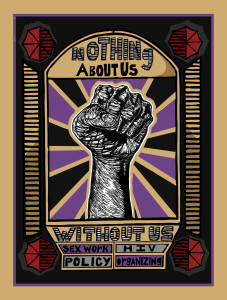The next International AIDS Conference (AIDS2018) will be held in Amsterdam, July 23 to 27, 2018. The Best Practices Policy Project regularly communicates with our networks to ensure that communities in the US have the most up-to-date information about activities at AIDS2018. If you are from the community of sex workers in the US and need support, please contact us at hivaidsbppp@gmail.com to get information and assistance in regards to applying to attend. Please also view our webinar on how to apply. Sex worker rights advocates interested in health and rights, and creating a presence at the AIDS2018 are encouraged to:
- apply for a scholarship from the International AIDS Society by February 5, 2018. According to the AIDS2018 website scholarships are for “people from resource-limited settings and communities, researchers, young people, community activists and civil society representatives” which in BPPP’s experience does include sex worker rights advocates. Please note that a “letter of recommendation” is needed to apply. The AIDS2018 website also states that “priority will be given to those whose participation will help enhance their work in their own communities, to those who are able to assist in the transfer of skills and knowledge acquired at the conference, and to those whose abstract, workshop or programme activity submission has been selected.” So, applying to be part of the conference by presenting, organizing a workshop or taking part in the “global village” will enhance chances in getting a scholarship. More details on how to apply for are available AIDS2018 and via the IAC’s webinars online. If you are a representative of the movement for the rights of sex workers in the United States and/or a community organizer for the rights of people in the sex trade and need some help applying or a letter of recommendation, then email hivaidsbppp@gmail.com by January 20, 2018 to see how we might be able to assist.
- Submit an abstract to present about your work or research by February 5, 2018. The AIDS2018 abstract mentoring program is open to provide support if you register by January 15, 2014. If the AIDS2018 mentoring program is not what you need, please email hivaidsbppp@gmail.com by January 25, 2018 to see how we might be able to assist.
- Apply to present about your work, organize a workshop or to showcase your cultural works at the Global Village and Youth Program by February 5. If you are a representative of the movement for the rights of sex workers in the United States and/or a community organizer for the rights of sex workers and people in the sex trade and need some help applying then email BPPP hivaidsbppp@gmail.com by January 25, 2018 to see how we might be able to assist.
The International AIDS Conference is a very large event and can be daunting. Sex workers have organized protests and actions about specific issues at the conference over the years and have demanded change from the conference itself. If issues emerge that you want to talk about or if something concerns you as a community organizer for the rights of sex workers and people in the sex trade then email hivaidsbppp@gmail.comat any time in the run up to the conference and we will do our best to connect you and to hear what you have to say.
Why attend? Globally and within the US sex workers organize to address the impact of HIV/AIDS. Even though criminalization and stigma compound the impact of HIV on the sex sector, community based organizing, peer lead programs, harm reduction and grassroots research lead by sex workers are extremely effective. Sharing the achievements of sex worker communities and providing accurate information about what sex workers need in terms of services and policy are two very good reasons why representatives of sex worker rights organizations attend the International AIDS Conference. Sex workers also converge on the conference because it is one of the very few opportunities for folks to spend time with their colleagues from all over the world, to forge new connections, to learn and to inspire. We have supported sex workers attendance at International AIDS conference for more than a decade and are here to help.

